Related Research Articles

The Industrial Workers of the World (IWW), members of which are commonly termed "Wobblies", is an international labor union that was founded in Chicago in 1905. The origin of the nickname "Wobblies" is uncertain. IWW ideology combines general unionism with industrial unionism, as it is a general union, subdivided between the various industries which employ its members. The philosophy and tactics of the IWW are described as "revolutionary industrial unionism", with ties to socialist, syndicalist, and anarchist labor movements.

William Ernst Trautmann was founding general-secretary of the Industrial Workers of the World (IWW) and one of 69 people who initially laid plans for the organization in 1904.
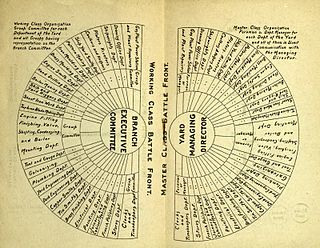
Industrial unionism is a trade union organising method through which all workers in the same industry are organized into the same union, regardless of skill or trade, thus giving workers in one industry, or in all industries, more leverage in bargaining and in strike situations.

Franklin Henry Little, commonly known as Frank Little, was an American labor leader who was murdered in Butte, Montana. Although no one was apprehended or prosecuted for Little's murder, many people have speculated about it. He joined the Industrial Workers of the World in 1905, organizing miners, lumberjacks, and oil field workers. He was a member of the union's Executive Board when he was murdered.

"Solidarity Forever", written by Ralph Chaplin in 1915, is a popular trade union anthem. It is sung to the tune of "John Brown's Body" and "The Battle Hymn of the Republic". Although it was written as a song for the Industrial Workers of the World (IWW), other union movements, such as the AFL–CIO, have adopted the song as their own. The song has been performed by musicians such as Utah Phillips, Pete Seeger, Leonard Cohen, and Seth Staton Watkins. It was redone by Emcee Lynx and The Nightwatchman. It is still commonly sung at union meetings and rallies in the United States, Australia and Canada, and has also been sung at conferences of the Australian Labor Party and the Canadian New Democratic Party. This may have also inspired the hymn of the consumer cooperative movement, "The Battle Hymn of Cooperation", which is sung to the same tune.
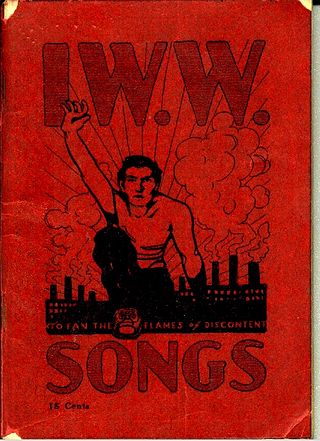
Since the founding of the Industrial Workers of the World (IWW), songs have played a large part in spreading the message of the One Big Union. The songs are preserved in the Little Red Songbook.

The Centralia Tragedy, also known as the Centralia Conspiracy and the Armistice Day Riot, was a violent and bloody incident that occurred in Centralia, Washington, on November 11, 1919, during a parade celebrating the first anniversary of Armistice Day. The conflict between the American Legion and Industrial Workers of the World members resulted in six deaths, others being wounded, multiple prison terms, and an ongoing and especially bitter dispute over the motivations and events that precipitated the event. Both Centralia and the neighboring town of Chehalis had a large number of World War I veterans, with robust chapters of the Legion and many IWW members, some of whom were also war veterans.

The Industrial Worker, "the voice of revolutionary industrial unionism", is the magazine of the Industrial Workers of the World (IWW). It is currently released quarterly. The publication is printed and edited by union labor, and is frequently distributed at radical bookstores, demonstrations, strikes and labor rallies. It covers industrial conditions, strikes, workplace organizing experiences, and features on labor history. It used to be released as a newspaper.
Matti Valentin Huhta, better known by his pen name T-Bone Slim, was an American humorist, poet, songwriter, hobo, and labor activist, who played a prominent role in the Industrial Workers of the World (IWW).
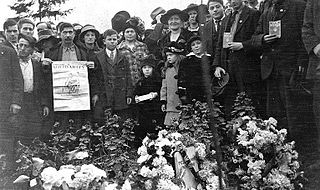
The Everett Massacre was an armed confrontation between local authorities and members of the Industrial Workers of the World (IWW) union, commonly called "Wobblies". It took place in Everett, Washington on Sunday, November 5, 1916. The event marked a time of rising tensions in Pacific Northwest labor history.

Elizabeth Gurley Flynn was an American labor leader, activist, and feminist who played a leading role in the Industrial Workers of the World (IWW). Flynn was a founding member of the American Civil Liberties Union and a visible proponent of women's rights, birth control, and women's suffrage. She joined the Communist Party USA in 1936 and late in life, in 1961, became its chairwoman. She died during a visit to the Soviet Union, where she was accorded a state funeral with processions in Red Square attended by over 25,000 people.

The Workers' International Industrial Union (WIIU) was a Revolutionary Industrial Union headquartered in Detroit in 1908 by radical trade unionists closely associated with the Socialist Labor Party of America, headed by Daniel DeLeon. The organization was formed when it broke with the main faction of the Industrial Workers of the World (IWW) over the question of political action.
Free speech fights are struggles over free speech, and especially those struggles which involved the Industrial Workers of the World and their attempts to gain awareness for labor issues by organizing workers and urging them to use their collective voice. During the World War I period in the United States, the IWW members, engaged in free speech fights over labor issues which were closely connected to the developing industrial world as well as the Socialist Party. The Wobblies, along with other radical groups, were often met with opposition from local governments and especially business leaders, in their free speech fights.
Wobbly lingo is a collection of technical language, jargon, and historic slang used by the Industrial Workers of the World, known as the Wobblies, for more than a century. Many Wobbly terms derive from or are coextensive with hobo expressions used through the 1940s.
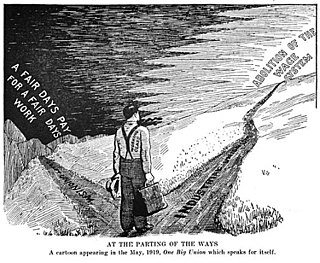
The Industrial Workers of the World (IWW) is a union of wage workers which was formed in Chicago in 1905 by militant unionists and their supporters due to anger over the conservatism, philosophy, and craft-based structure of the American Federation of Labor (AFL). Throughout the early part of the 20th century, the philosophy and tactics of the IWW were frequently in direct conflict with those of the AFL concerning the best ways to organize workers, and how to best improve the society in which they toiled. The AFL had one guiding principle—"pure and simple trade unionism", often summarized with the slogan "a fair day's pay for a fair day's work." The IWW embraced two guiding principles, fighting like the AFL for better wages, hours, and conditions, but also promoting an eventual, permanent solution to the problems of strikes, injunctions, bull pens, and union scabbing.
The Agricultural Workers Organization (AWO), later known as the Agricultural Workers Industrial Union, was an organization of farm workers throughout the United States and Canada formed on April 15, 1915, in Kansas City. It was supported by, and a subsidiary organization of, the Industrial Workers of the World (IWW). Although the IWW had advocated the abolition of the wage system as an ultimate goal since its own formation ten years earlier, the AWO's founding convention sought rather to address immediate needs, and championed a ten-hour work day, premium pay for overtime, a minimum wage, good food and bedding for workers. In 1917 the organization changed names to the Agricultural Workers Industrial Union (AWIU) as part of a broader reorganization of IWW industrial unions.
The Industrial Workers of the World (IWW) is a union of wage workers which was formed in Chicago in 1905. The IWW experienced a number of divisions and splits during its early history.
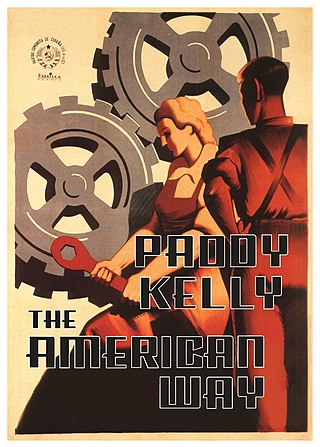
The American Way is the second in a four novel series entitled Building of Empire, Crime and Politics; the Cornerstone of America by author Paddy Kelly. The American Way relates the events leading up to and through the Great Woolen Strike of 1912 in Lawrence, Massachusetts when approximately 40,000 immigrants from nearly every country in Europe, sharing 30 religions and 127 ethnic back grounds organized a seven-week strike against the richest man in the world. This despite the fact that only ten percent of them spoke English. Released in 2011 the title of this historical fiction is originally taken from the opening lines of the 1950s Superman television program Adventures of Superman (1952–1958) ".. . truth, justice and the American way!" However the catch phrase is meant as an entendre in that the American Way, usually perceived as the right and good way, is also in reality a two edged sword of unprecedented levels of corruption found at all levels of industry and government at the time the story is set.
Frederick Willard Thompson was a Canadian-American labor organizer and historian. A member of the Industrial Workers of the World (IWW) for 65 years, he was first elected to the General Executive Board in 1928. He served in various capacities for the organization, including as the General Secretary-Treasurer of the Industrial Workers of the World from March 1936 to February 1937 and as editor of the IWW's primary newspaper, the Industrial Worker. In a 1987 obituary published by Labour/Le Travail, scholar and poet Franklin Rosemont described Thompson as "the most influential Wobbly since the 1930s."
References
- ↑ Philip Sheldon Foner, History of the labor movement in the United States, 1980, 4th edition, page 108
- 1 2 Melvyn Dubofsky, We Shall Be All: A History of the Industrial Workers of the World , University of Illinois Press Abridged, 2000, page 78
- ↑ The I.W.W.: Its First Seventy Years, 1905-1975, Fred W. Thompson and Patrick Murfin, 1976, pages 38-39